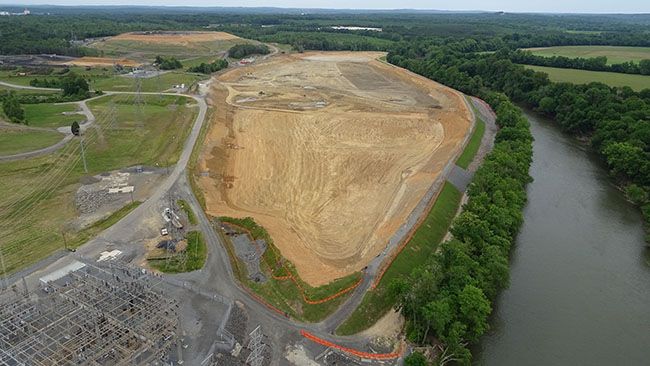
Environmental advocates have reached a settlement with Duke Energy and the North Carolina Department of Environmental Quality to permanently close all remaining coal ash basins in North Carolina.
The agreement, which culminates years of legal battles and resolves pending litigation over Duke Energy’s ash basin closure methods, calls for about 80 million tons of coal ash to be excavated from six Duke Energy sites across the state and moved to lined landfills.
Supporter Spotlight
The agreement follows settlements and court orders requiring cleanups and excavation of coal ash at eight other Duke Energy sites in North Carolina, including the Sutton site in Wilmington, the Cape Fear site near Sanford, both on the Cape Fear River, and the Lee site on the Neuse River near Goldsboro.
Disputes over coal ash closure plans were pending in various courts, including the North Carolina Office of Administrative Hearings, North Carolina Superior Court and United States District Court for the Middle District of North Carolina. The parties are expected to make the necessary court filings to dismiss each case.
The Southern Environmental Law Center had represented numerous community groups including Cape Fear River Watch, the Neuse River Foundation/Sound Rivers, the Roanoke River Basin Association, the Waterkeeper Alliance, Sierra Club and the N.C. State Conference of the NAACP.
“This agreement is the culmination of nine years of work by communities across North Carolina and puts in place the most extensive coal ash cleanup in the nation,” said Frank Holleman, senior attorney at the Southern Environmental Law Center. “With the agreements and court orders governing eight other coal ash sites, we now have in place a historic cleanup of coal ash lagoons to protect North Carolina’s clean water and families from coal ash pollution. North Carolina’s communities will be safer and North Carolina’s water will be cleaner than they have been in decades.”
Duke Energy called the settlement a “major achievement” that will reduce its total estimated cost to close the nine basins by about $1.5 billion. Seven of the basins will be excavated, with ash moved to lined landfills, including two at the Allen Steam Station in Belmont, one at Belews Creek Steam Station, one at Mayo Plant in Roxboro, one basin at the Roxboro Plant in Semora and two at the Cliffside/Rogers Energy Complex in Mooresboro.
Supporter Spotlight
At the Marshall Steam Station in Terrell and the Roxboro Plant, uncapped basin ash will be excavated and moved to lined landfills. At both locations, sections of the basins were filled with ash in the past. To make use of that space, state permitted facilities, including existing lined landfills, were built on top of those portions of the ash basins. Because the ash underneath is already covered, that material will not be disturbed and will be monitored and safely closed under other state regulations.
Under the plan, almost 80 million tons of ash will be excavated from the remaining sites. The company is already removing ash from basins at other facilities, bringing the total amount of material to be excavated in North Carolina to around 124 million tons.
The agreement calls for expedited state permit approvals which would keep projects on a rapid timeline with excavation at the six sites completed in 10 to 15 years.
“This agreement significantly reduces the cost to close our coal ash basins in the Carolinas for our customers, while delivering the same environmental benefits as full excavation,” said Stephen De May, North Carolina president, Duke Energy. “We are fully focused on these important activities and building a clean energy future for the Carolinas.”
Basin excavation is completed or nearly completed at 10 basins at the Asheville Plant, the Dan River Plant in Eden, the Riverbend Steam Station in Mt. Holly, the Sutton Plant in Wilmington, the Weatherspoon Plant in Lumberton and one basin at the Rogers Energy Complex. That material is being recycled or disposed of in lined landfills.
Material from 12 basins at Buck Steam Station in Salisbury, the Lee Plant in Goldsboro and the Cape Fear Plant in Moncure will be reprocessed and recycled into construction material.







